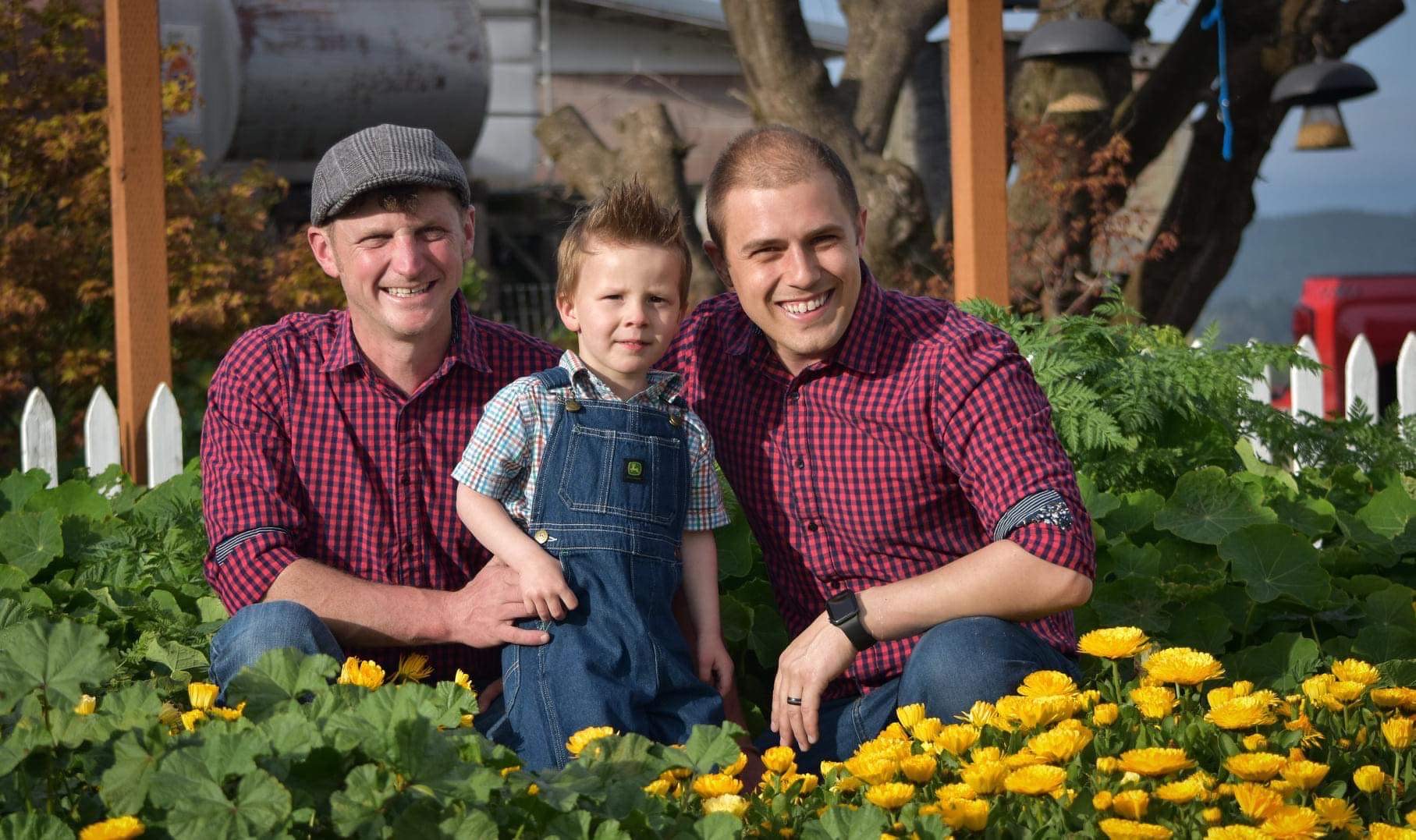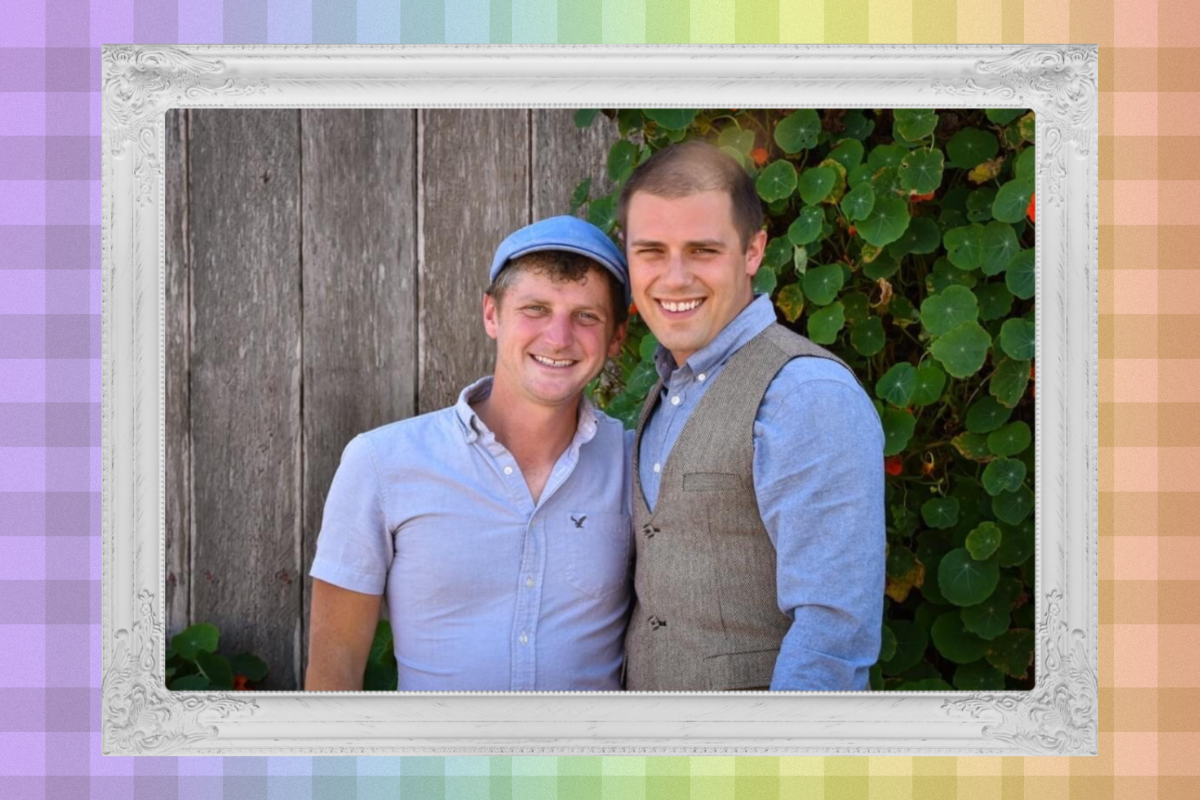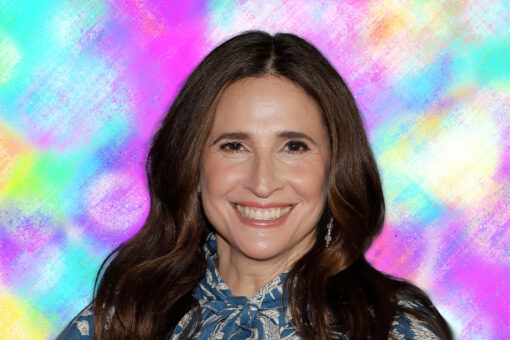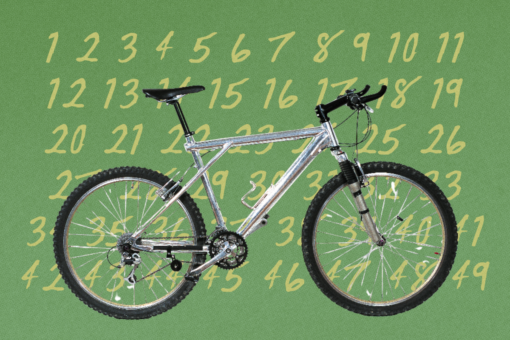Cody Nicholson Stratton isn’t your average TikToker. Among the reported 1 billion users on the app, the Northern Californian farmer stands on his own as the Unorthodox Farm Daddy, which also happens to be his handle.
Where other pages on the social media site tend to stick with one kind of video — fashion, comedy, dancing, etc. — @UnorthodoxFarmDaddy spans genres, as Cody depicts every facet of his life as a married gay farmer, dad and observant Jew. When you scroll through his page, you’re never exactly sure what you’re going to get. On one day, you’ll see Cody proudly celebrating queer, Jewish identity:
@unorthodoxfarmdaddy #MakeNightsEpic #CatchChobaniOatmilk #AmazonVirtualTryOn #pride #pridemonth #lgbt
On another, you’ll see both Foggy Bottoms Boys — an endearing local nickname for Cody and his husband, Thomas:
@unorthodoxfarmdaddy What’s your cut? #ReadyForHell #MINDORDERING #pridemonth #gayfarmer
No matter what, you’ll always get wholesome farm content:
@unorthodoxfarmdaddy Lambing season is the happiest season #gayguy #gay #fyp #babyanimal #animalsoftiktok #petsoftiktok #umyeah
And if you’re lucky, you might even get a video featuring Cody and Thomas’ son Silas, whom they affectionately call The Tiny Farmer:
@unorthodoxfarmdaddy He insists on feeding the ram lambs #farmkid #MadewithKAContest #parentsoftiktok
The wide breadth of videos on Cody’s TikTok page creates a complete portrait of his life — and makes for some of the most authentic and heart-warming queer Jewish content I’ve ever seen.
I recently caught up with Cody to discuss why he created @UnorthodoxFarmDaddy, living Torah through farming and Jewish LGBTQ+ representation online.
This conversation has been lightly edited and condensed for clarity.
Can you tell me about your Jewish identity and background?
So I was raised very much secularly. I have Jewish descent, but “the wrong descent,” as the saying goes. So it wasn’t part of my upbringing, really; we did not go to synagogue. And then when I was in college, I had a boyfriend who was observant. I reconnected with Judaism that way, and then ended up doing beit din and conversion.
I moved home after college, and now the whole family is an amalgamation of the traditional American family: we have Protestants and Catholics and Jews, through me and Thomas and then also other family members that have married Jews. And so we very much have an interfaith family now, which is pretty awesome and great.
In terms of my practice now, we live in a rural area and there’s one synagogue for our entire county (well, and a Chabad House at the university) which, in terms of land mass, is bigger than the state of Delaware. It’s a 45-minute drive for us to get to synagogue.
Jewish life in Humboldt County is definitely interesting. We have two rabbis now from the Renewal movement, but they only conduct one service a month; other services are led by lay leaders. We end up with everything from a secular, humanistic service to Conservative. They really try to serve the entire Jewish community of Humboldt, which is about 200 families. It’s a nice way to connect with the rest of the Jewish community in Humboldt; the synagogue is doing the best it can with limited size and resources.

Is Thomas Jewish as well?
No, so I am actually the only Jew in the family. We always joke that Thomas is Jew-ish. Basically, he’s here for the latkes. He was actually raised in an almost evangelical Christian family and then ended up with a practicing Jewish boyfriend. We wanted to raise Silas Jewish, and then we started attending synagogue. Thomas has an amazing voice, so he sings — which is quite fun to have the goy husband singing. If he doesn’t volunteer, our Rabbi usually either calls on him or shames him into it.
That’s great. So just based on your presence on TikTok, it seems like you lean more Conservative Jewish or almost Modern Orthodox. Is that accurate?
I would identify more as Reform. But I do wear a kippah or flat cap, and for me, that really was a result of the Tree of Life synagogue shooting. Up until then, I really only wore kippot in Jewish spaces for the most part. [After Tree of Life], I just felt like, well, I’m not in Jewish spaces for most of the time, especially being in agriculture. There are not a lot of observant Jews in agriculture. And the visibility is really important, whether you’re queer or Jewish or a member of any minority group. And so being outwardly Jewish by wearing the kippah gives you that visibility.
Even identifying as more Reform, do you ever struggle to reconcile that not all Jewish communities are accepting of the LGBTQ+ community?
I think it was Rabbi Sacks who had a great quote saying, essentially, we’re all inherently worthy. We’re all inherently equal and absolutely perfect if we’re made in God’s image. And so I think if we are all made in God’s image, we are all unique, we’re all inherently worthy of love and of acceptance. That’s the way that I see the value in all of us. We’re all unique, beautiful individuals.
Thank you for sharing that. How did @UnorthodoxFarmDaddy come to be?
We have social media for our farm, which is @FoggyBottomsBoys. And at the beginning of the pandemic I started an Instagram because I love baking challah. I made lots of rainbow and sparkle challahs for Tot Shabbat at our synagogue, before we went on Zoom due to COVID. And to show all of those, I wanted to make a more Jewish Instagram account than @FoggyBottomsBoys. I was trying to come up with a handle and I really liked using “Unorthodox” because I’m not really Orthodox, so that seemed to fit. And we farm, and, you know, within the gay community, once you have a kid, you automatically get the daddy label. So it was like, I’ll just mash that all together and go with it. Plus, at that point I wanted to make a TikTok and Tom was like, Oh, I know how you’re going to act on TikTok, it can’t be the farm TikTok. So I made the @UnorthodoxFarmDaddy TikTok and have just sort of rolled with that as a way to do some Jewish content, some farm content and some queer content. It’s really just the glorious melange that is my life.
And what was it like to actually gain a following on that?
I was very surprised. I didn’t anticipate the following that I ended up with. It’s been fun. We live in a town of 1200 people, so we know everyone in town for the most part, but then tourists will come through and recognize me. So that’s been interesting.
Your TikTok bio says you’re an “Organic Regenerative Farmer.” Can you explain what that means?
So our dairy is certified organic. Organics is really a legal term. There is a set framework by the USDA that you have to comply with under the National Organic Program. And so our land is predominantly certified organic and our dairy is certified organic, so we comply with both USDA organics as well as the Chinese organic standard — because the company that we produce milk for exports lactose to China. That relates to certain standards in terms of record keeping, herbicides, fertilizers, living conditions for the animals, etc. And we’re also certified humane and free range, so the spatial requirements for our farms are actually slightly larger.
It’s interesting — our beef cattle and sheep are not certified organic because organics prohibits the use of antibiotics. You’re actually legally required to give antibiotics to save the animal’s life, but they just can’t be sold organically. But sheep have a tendency to pick up everything, so having access to antibiotics in your toolbox is really important for their well-being and their welfare. So we’ve not chosen to make any sort of transition to organic with the sheep. We also work with rare breeds and we don’t want to limit the animals that can be within our gene pool by removing them because they don’t fit in the organic program.
And then regenerative is really where we are as a whole brand. It’s about soil health, sequestering atmospheric carbon and really improving your land base and tracking that. We are currently working on having a carbon farm plan drafted, a 150-page document that tracks all of our carbon emissions. And then we do soil testing. We use animal impacts to improve the land and the soils and to increase biodiversity in our plant communities and the wildlife habitats.
For example, on Cock Robin Island, an island in the mouth of the river, we have wildlife corridors that run through the whole property so birds and amphibians can move through it without having to go out into the pastures if they want, or they have access to the fields as well. We have another property in the hills where our sheep usually winter. This year, there’s an invasive grass species called Medusahead that is becoming more prominent. So we’re timing our grazing so the sheep can remove it before it goes to seed in that area. We also use the animals to reduce fuel loads because wildfires are such a big issue.
We mean regenerative not just for regenerating the land, but regenerating community as well. We focus on supplying local protein and work with our local food banks. I like to view regenerative agriculture as an act of tikkun olam, repairing what is broken in the world.
That’s such a mitzvah — and seems very much in line with the Jewish values of keeping the land alive and ensuring the respect and dignity of all animals.
Yes, I think farming regeneratively does really lend itself to Jewish law and to Torah. I think Jews often forget that we were an agrarian people, but if you look at Torah from an agricultural perspective, there is a lot there that informs us as to how we should farm, how we should treat animals and wildlife and our communities. And it’s surprising how many common practices are Torah even just within agricultural communities. It’s common farming practice to feed animals before you feed yourself and that’s an act of living Torah. It’s amazing.
@unorthodoxfarmdaddy Every day #jewishtiktok #jewish #gay #gayfarmer #farming #fyp #itsgoingdown
Are there any other examples of ways that you incorporate Jewishness or Jewish law into farming? I saw the TikTok where you said your meat isn’t kosher because you simply don’t have access to a kosher facility.
Yeah — we leave the margins of our fields, but we take a slightly different spin on it. Because we raise protein, we’re not growing crops. So we try to leave margins of field, especially the corners, not for the community of people, but for the wildlife community. We’re setting them aside as native pollinator habitats in a lot of cases.
And tsa’ar ba’alei chayim, the idea of not inflicting harm on animals, is in everything we do. Our whole premise is built around the idea that the sheep and the cows that are destined to become pasture-raised, grass-fed protein, their whole life is supposed to be good. And then one day, we take them to a butcher 20 minutes from our farm. They only take 10 to 20 animals a day, so it’s very hands-on, it’s much more personal. And I think that’s important, because it is an act of taking a life. We’re taking that life to sustain our community, but there should be value in it. It shouldn’t just be a rote mechanical act.
As regenerative farmers, everything we do is done with their health in mind. If they need veterinary care, then they get veterinary care. We maintain a working relationship with our veterinarian, who comes monthly, regardless, just to evaluate herd health and make sure everything is on plan, And we have written protocols that they approve on how we handle any medical emergencies.

With your busy farm schedule, do you ever struggle to find time for whatever Jewish practice you keep up with?
Yes. We make the exception for farming where we’re not shomer Shabbos because we just can’t be — the animals have to be taken care of. But we observe Shabbat weekly. We do Kabbalat Shabbat on Friday nights. Our synagogue is still on Zoom, so we generally join the Zoom unless something is going on; during lambing season we might join the Zoom from the lambing barn.
We try to make that a time where we sit down and have dinner with friends and family and are present together and reflect on what Shabbat means. And, of course, we light candles and make kiddush. Our 3-year-old knows the blessings already, and one awesome thing is that one of his teachers in his school is one of the other few Jews in our community. So every Friday, he goes to school and is super excited to tell her “Shabbat Shalom.”
But the holidays can be very difficult. Especially the High Holidays, because they often fall in a very busy time for farming. We try to schedule around them as much as possible, but it can be very hard to fast for 26 hours on Yom Kippur if you can’t make it to shul and it’s hot and you have to be outside. So for health and well-being sometimes we shift to being like, we’re going to drink water. We won’t eat, but we’re going to drink water because it’s 80 degrees and we’re outside with the animals and it’s just necessary.
Even then, we try to break fast with friends and family and hold as many of the holidays as we can, if we’re not able to be at synagogue. Rosh Hashanah is kind of our big one because it’s a harvest festival.
I loved what you said about your son earlier, because I love the videos that include him. Does he understand in some way that you’re on TikTok?
Yes, he does. So he’s 3, but his adoption actually only finalized last week — he’s been in foster care up until now. So we haven’t been able to show his face up until very recently, because that’s not legally allowed. Plus, for his privacy, we didn’t want to show his face a lot anyway. But it’s funny — his school takes both spring and fall class photos in preschool because the kids change so much. They were trying to get his photo this spring, and he kept dancing during it. And they had to be like, no, no Silas. It’s not a TikTok video. We’re taking your picture.
That’s so cute.
So he definitely understands what’s going on.
That’s great. This is a bit heavier, but what does it mean to be so publicly Jewish and also gay at a time when both antisemitism and anti-LGBTQ+ sentiments are on the rise? Have you dealt with antisemitism and homophobia on TikTok?
Yes, on TikTok, for sure. I will say, just in daily life, I don’t think there’s a gay person out there that hasn’t had a slur shouted at them from a moving vehicle. Right?
But even living in a rural community, I find the community is very supportive — with the exception of one Lutheran Church in town which is less than supportive of LGBTQ. I think they would definitely also like to convert us.
But as far as on TikTok, yeah, there have definitely been antisemitic and anti-LGBTQ comments, especially with the little bits that we shared of our son. We got a ton of anti-circumcision comments surrounding him. People we’re like, you’re going to hell. And it’s like, well, there’s not really a hell in Judaism. So you missed that one. But whether or not our son had a bris is really none of your business. That was probably the most surprising to me. Because I have to say, antisemitism is a little trite at this point. We’ve heard it all before. It’s never creative or new. Homophobia can sometimes pull out something that I haven’t heard before. But with antisemitism it’s never new.
We get it on both @UnorthodoxFarmDaddy and on @FoggyBottomsBoys. I find the best practice is, in most cases, to just block and delete. I don’t give them my energy, attention or traction through our platform. Especially now that we have 115,000 followers on TikTok. It’s like, I don’t need to give you any platform.
On the more positive side, how does it feel for you to serve as queer Jewish representation for your audience?
Honestly it’s not a role I expected to fill when I created the @UnorthodoxFarmDaddy handle. However, if sharing my life and authentic self with others through social media brings value and joy, then I’m glad to do it. Hopefully I’m able to show that it’s the many pieces of each of us that makes us uniquely beautiful.



